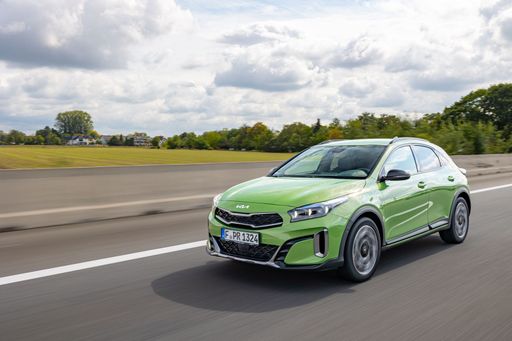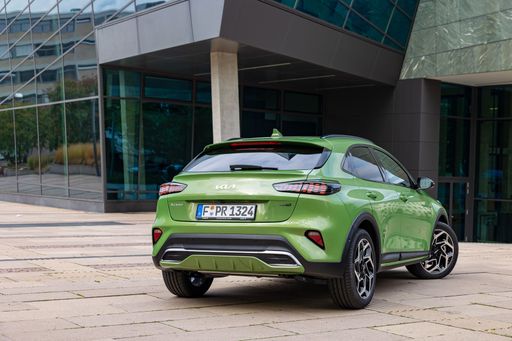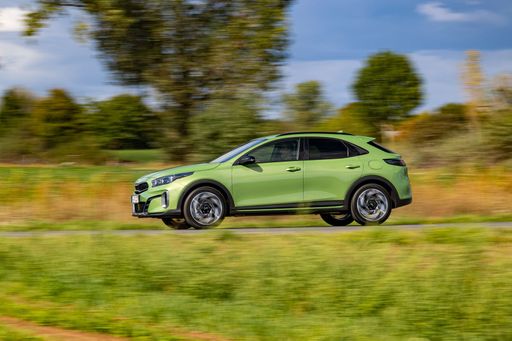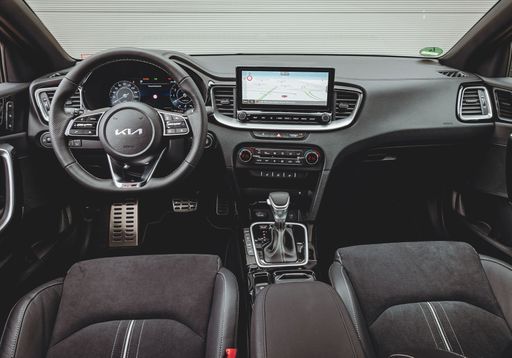Kia XCeed vs Nissan Leaf – Differences & prices compared
Compare performance, boot space, consumption and price in one view.
Find out now: which car is the better choice for you – Kia XCeed or Nissan Leaf?
The Kia XCeed (SUV) comes with a Petrol engine and Manuel or Automatic transmission. In comparison, the Nissan Leaf (Hatchback) features a Electric engine with Automatic transmission.
When it comes to boot capacity, the Kia XCeed offers 426 L, while the Nissan Leaf provides 394 L – depending on how much space you need. If you’re looking for more power, decide whether the 180 HP of the Kia XCeed or the 217 HP of the Nissan Leaf suits your needs better.
In terms of consumption, the values are 6.40 L per 100 km for the Kia XCeed, and 16.70 kWh for the Nissan Leaf.
Price-wise, the Kia XCeed starts at 23100 £, while the Nissan Leaf is available from 30800 £. Compare all the details and find out which model fits your lifestyle best!
Kia XCeed
The Kia XCeed offers a stylish and modern design, blending the sportiness of a coupé with the practicality of an SUV. Its interior is well-crafted, featuring high-quality materials and a range of advanced technology to enhance the driving experience. With an emphasis on comfort and efficiency, the XCeed provides a compelling option for those seeking a versatile and dynamic vehicle.
details @ press.kia.com
@ press.kia.com
 @ press.kia.com
@ press.kia.com
 @ press.kia.com
@ press.kia.com
 @ press.kia.com
@ press.kia.com
Nissan Leaf
The Nissan Leaf stands out as a pioneering model in the realm of electric vehicles, known for its impressive blend of practicality and eco-friendliness. It offers a smooth and quiet driving experience, making it an ideal choice for city commuting and longer journeys alike. The interior design is both comfortable and intuitive, providing drivers with a sense of modernity and ease of use.
details @ germany.nissannews.com
@ germany.nissannews.com
 @ germany.nissannews.com
@ germany.nissannews.com
 @ germany.nissannews.com
@ germany.nissannews.com
 @ germany.nissannews.com
@ germany.nissannews.com

|

|
|
|
|
Costs and Consumption |
|
|---|---|
|
Price
23100 - 33000 £
|
Price
30800 - 37200 £
|
|
Consumption L/100km
6.4 - 6.8 L
|
Consumption L/100km
-
|
|
Consumption kWh/100km
-
|
Consumption kWh/100km
16.7 - 17.8 kWh
|
|
Electric Range
-
|
Electric Range
270 - 385 km
|
|
Battery Capacity
-
|
Battery Capacity
39 - 59 kWh
|
|
co2
144 - 155 g/km
|
co2
0 g/km
|
|
Fuel tank capacity
50 L
|
Fuel tank capacity
-
|
Dimensions and Body |
|
|---|---|
|
Body Type
SUV
|
Body Type
Hatchback
|
|
Seats
5
|
Seats
5
|
|
Doors
5
|
Doors
5
|
|
Curb weight
1351 - 1419 kg
|
Curb weight
1580 - 1756 kg
|
|
Trunk capacity
426 L
|
Trunk capacity
385 - 394 L
|
|
Length
4395 mm
|
Length
4490 mm
|
|
Width
1826 mm
|
Width
1788 mm
|
|
Height
1483 - 1495 mm
|
Height
1540 - 1545 mm
|
|
Payload
471 - 479 kg
|
Payload
384 - 415 kg
|
Engine and Performance |
|
|---|---|
|
Engine Type
Petrol
|
Engine Type
Electric
|
|
Transmission
Manuel, Automatic
|
Transmission
Automatic
|
|
Transmission Detail
Manual Gearbox, Dual-Clutch Automatic
|
Transmission Detail
Reduction Gearbox
|
|
Drive Type
Front-Wheel Drive
|
Drive Type
Front-Wheel Drive
|
|
Power HP
115 - 180 HP
|
Power HP
150 - 217 HP
|
|
Acceleration 0-100km/h
8.5 - 11.7 s
|
Acceleration 0-100km/h
6.9 - 7.9 s
|
|
Max Speed
182 - 210 km/h
|
Max Speed
144 - 157 km/h
|
|
Torque
200 - 265 Nm
|
Torque
320 - 340 Nm
|
|
Number of Cylinders
3 - 4
|
Number of Cylinders
-
|
|
Power kW
85 - 132 kW
|
Power kW
110 - 160 kW
|
|
Engine capacity
998 - 1598 cm3
|
Engine capacity
-
|
General |
|
|---|---|
|
Model Year
2025
|
Model Year
2019
|
|
CO2 Efficiency Class
E
|
CO2 Efficiency Class
A
|
|
Brand
Kia
|
Brand
Nissan
|
Kia XCeed
The Striking Design of the Kia XCeed
The Kia XCeed presents a refreshing take on the compact SUV segment with its sleek silhouette and expressive design. Sporting an eye-catching front grille, LED headlights, and a stylish coupé-like roofline, it combines aesthetics with aerodynamics. This design not only enhances its road presence but also contributes to fuel efficiency.
Dynamic Engine Options
Underneath the stylish bonnet of the Kia XCeed is a range of lively petrol engines. With options extending from a 1.0-litre T-GDI producing 100 PS to a more robust 1.5-litre T-GDI pumping out 140 PS, drivers can select the ideal balance of power and efficiency. The engines are paired with either a manual or a dual-clutch automatic transmission, delivering a smooth and responsive driving experience.
Innovative Features and Technology
The Kia XCeed is not just about looks, but also brains. It comes loaded with innovative features like the advanced driver assistance system, providing a safer drive. The infotainment system is seamlessly integrated with smartphone capabilities, ensuring that drivers and passengers stay connected and entertained effortlessly.
Practicality Meets Performance
Despite its sleek appearance, the Kia XCeed does not compromise on practicality. It offers a generous boot space of 426 litres, making it an excellent choice for families and adventurers alike. The interior is designed for comfort, with ample headroom and legroom for all passengers.
Fuel Efficiency and Environmental Friendliness
Efficiency is at the heart of the Kia XCeed, with a fuel consumption range of 6.3 to 6.5 litres per 100 km. These figures position the XCeed as a competitive option for environmentally conscious drivers, despite the engine performance. The CO2 emissions stay within a moderate range, aligning with its commitment to sustainability.
Cost of Ownership
Owning a Kia XCeed is not only about driving joy but also financial prudence. With monthly costs ranging from €922 to €1,058 and a reasonable maintenance cost per kilometre, it is a sensible choice for those looking to minimise running expenses.
Conclusion: The Future of Compact SUVs
The Kia XCeed sets a new standard for what compact SUVs can offer, blending exciting design, dynamic performance, and cutting-edge technology. It's an ideal vehicle for those who want a mix of style, practicality, and efficiency in their automotive choice.
Nissan Leaf
Introduction to the Nissan Leaf: A Pioneer in Electric Mobility
The Nissan Leaf has established itself as a trailblazer in the realm of electric vehicles (EVs) since its launch. As we delve into its present-day iterations, the Leaf continues to soar in popularity due to remarkable advancements in technology and sustainability. Let's explore what makes the Nissan Leaf a standout in today's automotive market.
Power and Performance: Under the Hood of the Nissan Leaf
The Nissan Leaf boasts a power output ranging from 150 to 217 PS, depending on the battery option chosen. The vehicle's electric motor, a product of cutting-edge engineering, offers instant torque ranging from 320 to 340 Nm, resulting in impressive acceleration capabilities. The 0 to 100 km/h dash is achieved in as little as 6.9 seconds, showcasing its prowess in electric performance.
Battery Technology: Efficient Energy Management
When discussing the Nissan Leaf, battery technology is at the forefront. The available battery capacities range from 39 to 59 kWh, supporting an electric range between 270 to 385 km. This flexibility allows drivers to choose a model that best fits their driving habits, providing peace of mind for longer journeys without frequent recharging.
Sustainability: The Environmental Edge
One of the primary attractions of the Nissan Leaf is its commitment to sustainability. As an all-electric vehicle, it produces zero CO2 emissions, placing it in the top tier of the CO2-efficiency class with an 'A' rating. This clean energy approach contributes significantly to reducing environmental impact and supports Nissan's drive towards a greener future.
Design and Comfort: Aesthetic Appeal and Practicality
The Nissan Leaf is not just about efficiency; it's also designed for comfort and utility. With its sleek hatchback body and dimensions of 4490 mm in length, 1788 mm in width, and a height of up to 1545 mm, it offers ample interior space. The boot capacity ranges from 385 to 394 litres, providing sufficient storage for everyday needs. The model accommodates five passengers comfortably, ensuring a pleasant ride for everyone.
Innovations and Safety: Advanced Features for Peace of Mind
Nissan equips the Leaf with an array of intelligent features that enhance safety and convenience. The available equipment lines, including N-CONNECTA, Tekna, e+ N-CONNECTA, and e+ Tekna, offer varying levels of technology integration. ProPILOT Assist, e-Pedal, and a comprehensive suite of driver-assistance technology are just a few examples that highlight Nissan's commitment to innovation in the EV market.
Conclusion: The Nissan Leaf Continues to Lead
With prices ranging from €35,900 to €43,400, the Nissan Leaf remains an attractive choice for those looking to embrace electric mobility. It perfectly balances performance, design, and sustainability, making it a compelling choice in the competitive EV landscape. The Nissan Leaf not only represents the future of driving but also reinforces why it continues to be a leader in the electric vehicle community.
Is the Kia XCeed offered with different drivetrains?
The Kia XCeed is offered with Front-Wheel Drive.
The prices and data displayed are estimates based on German list prices and may vary by country. This information is not legally binding.
